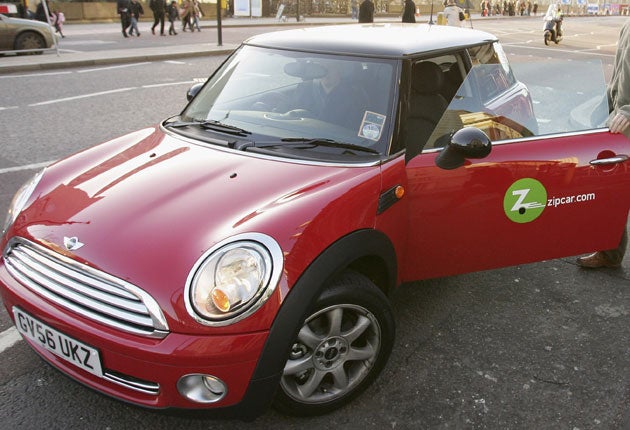Why not dare to share? It works for me in all sorts of ways, despite what the experts say
According to a new report, the sharing economy will never take off because we've been 'programmed' to possess

I’m writing this before going to a christening at St Bride’s Church in Fleet Street; I’ll get there by the simple technique of whistling up a car from my Uber app. Or I could leap in a Zipcar – there is one handily parked about 100 yards away from my house.
We don’t have a car, you see. We just use other people’s. And the same goes for our home. We own it, but we are happy to share it. This summer we are swapping it (via Love Home Swap) and we are also AirBnB-ing it. “Strangers in your house?” people say. “Yep. For about a month.” “Don’t you mind about them trashing it?” is the next question. “Have you seen the houses that are up for swapsies across the world?” I respond.
Luxurious doesn’t quite go there. Last summer we swapped our house for a home whose accoutrements included two signed paintings by Joan Miró, a lift and a hot tub. Frankly, I don’t think anyone is going to be too bothered about pinching our … what? Family photographs and a Yamaha piano? The people we are swapping with this summer are so lovely they are even going to look after our dog for a week. Yes, we are even sharing Disney. It’s a win-win situation, not least because the prospect of people coming to live here will force me to turn the house out, tidy it up to preposterous standards and deal with the fact that there might be mice in the larder. Might.
As many economists have pointed out, the swapping/sharing trend is bang on at the moment. It extends to our private lives, for do we not now share every single experience, even leaping around half-naked on sacred mountains? Everything is shared, many times over; indeed, it isn’t really valid until it is shared. Who wants a private experience?
This happy communal vision of an internet-driven Utopia has been somewhat slammed, I am sad to say, by Nottingham Trent University, which has produced a report utterly pooh-poohing it. According to the report, published in The Journal of Cleaner Production, sharing as the way forward will never really take off because Capitalism is King. People have a “strong psychological desire” to own stuff. We simply love buying things and amassing them for ourselves. Sharing is all very well but, deep down, we want our stuff.
This chimes in with all those (slightly smug) columnists who have spent the days since 8 May waggishly saying: “We told you so! The free market and private ownership is, and has always been, the way forward.” Socialism, or the sharing of assets, will never overtake capitalism, concludes the report, because we are “programmed” to possess. Tim Cooper, a co-researcher on the study, says (unsurprisingly) that manufacturers have cottoned on to this, building obsolescence into necessities such as fridges and washing machines, so we go on buying new ones. Those who devise white goods could, of course, make them to last 20 or 40 years. They could even make bland uniform ones we could all rent. But we don’t like that. Newer, faster, bigger; we want to own dishwashers and washing machines with gimmicks such as integrated dry cleaning, and we like to replace them quite often.
Everyone, that is, apart from people like my parents who grew up in the war and hence do not buy into what Professor Cooper terms the “replacement cycle” of household goods. For example, 64 per cent of vacuum cleaners are thrown away when they are still working, largely because people can’t be bothered to change the filter, a fact that will make anyone reading this who is over 75 roll their eyes in despair.
My children, whose internal programming has been wired wholly in the 21st century, display the validity of Professor Cooper’s findings. They are ashamed that we do not have a car. They hate getting into a Zipcar. They want the personal status afforded by families who have their own car, and express deep embarrassment that we have to share motorised transport. No matter of argument, fiscal or ecological, will shift this.
Equally, they actively dislike the notion of having to share their bedrooms with visitors. Oh, they love going to stay in other people’s palatial residences, and have become quite accustomed to the hot tub/infinity pool set-up of the swaps we have enjoyed across the world. But when it comes to the other way round? Then the smiles disappear. They whine and complain about having to empty even one drawer in their bedrooms for swappers to use. (Should you be tempted, this is about all that is necessary, plus, obviously, manic tidiness, no mice, clean sheets and an array of beautiful bathroom products).
Perhaps what this report shows is that we early adopters of the digital marketplace are claiming too much for it; that all it is about is convenience, and a faster offer for regular things such as car or room rental. It is not about the invention of a brave new wi-fi fuelled world of communal living. Apart from personal experience on social media, that is. I don’t think we will ever return to a world where we do not want to tell as many people as possible about our personal experiences. And that is not about ecology. It is about ego.
Join our commenting forum
Join thought-provoking conversations, follow other Independent readers and see their replies
Comments
Bookmark popover
Removed from bookmarks